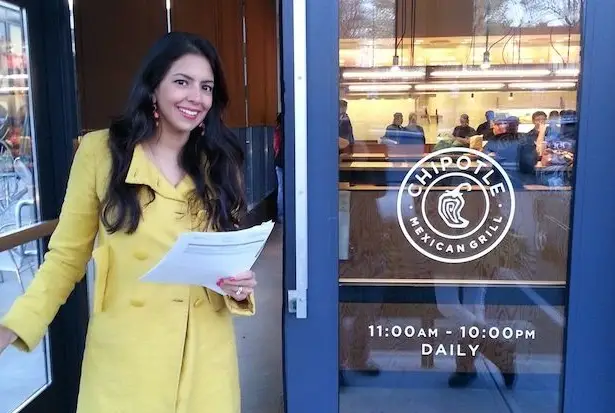
On March 22nd 2013, Vani Hari, the hugely followed “health” blogger known as the Food Babe, received a letter from Chipotle’s communications director with a list of the ingredients in every one of the restaurant chain’s dishes. It was a huge victory for Hari and her followers after she launched an “investigation” in 2012, looking for answers in regards to what the restaurant used in its food.
“What I found was startling,” Hari said in a 2013 interview with TakePart. “Most of their food was contaminated with genetically modified cooking oil, corn oil, and they were using genetically modified ingredients in their tortillas. Even in the black beans there was GMO soybean oil. You couldn’t even order vegetarian and avoid it. It was really unfortunate. Then, when I saw their flour tortillas’ package, it said that they use trans-fat. That’s crazy.”
According to the TakePart piece, Chipotle’s director of public relations, Chris Arnold, requested a meeting with Hari about a week after she posted the list’s contents on her blog.
Arnold offered a couple reasons for why Chipotle did not post ingredients on their website, including recipe secrecy and ingredient variance between states. But Hari wasn’t convinced. She asked why wouldn’t McDonald’s or Wendy’s or Burger King think the same thing? Why do they release their ingredients? And if different states have different ingredients, why don’t you just say that and list ingredients by state?
Soon after the meeting, Hari’s minions launched a petition demanding that Chipotle make their ingredients available to the public. The Food Babe pocketed yet another victory.

“The best part is that they took the genetically modified soy bean oil out of the black beans, so you can actually have a black bean salad with guacamole, and avoid GMO’s and avoid all the chemicals,” Hari said, adding that the restaurant chain giant committed to eliminating hydrogenated oils, tortilla preservatives, and GMOs in the future.
Fast forward to November of 2015, and you’ll remember that the chain shut down 43 restaurants in the Pacific Northwest due to an E. coli outbreak. But that didn’t solve the problem. During the weeks that followed, people in 7 states contracted food-borne illnesses from eating at Chipotle, this time with a “garden variety” norovirus.
Ironically, Chipotle’s problem wasn’t its use of GMO foods (which are practically impossible to fully eradicate), but pure negligence. Improper cooking temperatures and lack of hand washing were among the culprits.
https://twitter.com/thefoodbabe/status/317618828043513856
At the time, 16 major international science organizations had deemed GMO foods to be safe to eat, and in spite of the fact that Chipotle had caved to a growing pseudoscience movement led by a known charlatan, the brand suffered barely any backlash.
From New York Magazine:
Part of the reason GMO hysteria arose in the first place is that most people barely know what GMOs are…
They fear GMOs because of all the images of syringes and tomatoes and evil-looking scientists that pop up when they Google the term, and because of the false specter of giant rat tumors. This fear has created a a gulf between the public’s views on GMOs and those of the scientific Establishment. As Mark Lynas, a researcher at the Cornell Alliance for Science and former anti-GMO activist, pointed out in a Times Sunday Review article on how he came around to the technology, a recent poll showed that while “88 percent of … scientists agreed it was safe to eat genetically modified foods, only 37 percent of the public did — a gap in perceptions of 51 points,” he wrote. That is significantly larger than the gap on climate change (37 points) or childhood vaccinations (18 points).
Most consumers aren’t going to carefully analyze the scientific consensus on a given issue — who has time for that? Rather, they use mental shortcuts, taking cues from people and institutions they trust. Chipotle has developed a reputation for corporate responsibility and making careful decisions about the ingredients on its menu, and Chipotle ditched GMOs — therefore, GMOs must be bad. Chipotle scores points, science loses. Surely other companies looking to capitalize off of a veneer of corporate do-goodery are keeping a close eye on this.
Tragically, in their effort to satiate the hysterics of the intellectual kinfolk of anti-vaxxers and chemtrail truthers, the focus on keeping tried and true practices in regards to food safety became muddled.
At last count, 236 people were sickened from the tainted food. We’re still waiting for the Food Babe to launch an investigation.





Leave a Reply